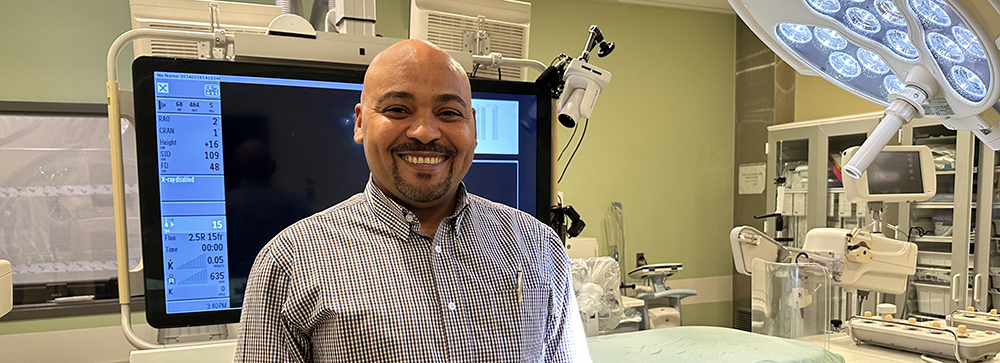The era of healthcare engineers: a technological revolution in the making
Today, biotechnology engineers are not only indispensable but vital to the proper functioning of a hospital, especially in a university context, where their expertise is absolutely crucial.
The impressive automation of certain procedures, as well as the lightning-fast integration of cutting-edge technologies like fibre optics and video camera, have literally transformed the world of surgery. We no longer operate simply with a scalpel. An array of innovative and revolutionary technologies are now being used, giving biomedical engineers a role of considerable importance and influence.
.jpg)
|
_0.jpg)
|
MUHC biomedical engineer, Patrick Divoungui, transports us to a world where many surgeries are now assisted by images of exceptional quality. These astonishing advances require excellent resolution, impressive magnification potential and high transmission speed. Miniature medical instruments enable us to perform surgeries that are not only much less invasive, but also remarkably precise and delicate.
If that wasn't enough to illustrate the scale of this revolution, in a university hospital, we sometimes have virtually assisted operations, a true summit of innovation and international collaboration. Patrick tells us of a fascinating case where a doctor in Japan virtually assisted an operation taking place at the Montreal General Hospital. These things are becoming increasingly commonplace in the context of sharing and exchanging exceptional knowledge. These leading-edge technologies require and enhance the biomedical engineers’ knowledge of electrical, medical imaging, biology and multidisciplinary project management.
.jpg)
|
.jpg)
|
Patrick initially studied mechanical engineering, but it was later, with unwavering passion, that he immersed himself in biomedical engineering. At the MUHC, he is a true orchestra conductor, leading major projects related to new technologies. With constant attention to detail, he ensures that what the hospital purchases perfectly meets the needs of its most exacting clients, the various medical teams and complies with current standards and regulations.
The way the selected option is integrated into MUHC infrastructure must then be examined with the utmost rigor. For example, when acquiring a new cardiovascular intervention device, it is important to ensure that the technology delivers optimum performance and that it is designed for maximum flexibility of movement around the patient, so that clinical procedures are comfortable, safe and effective. In some cases, it is also necessary to wrap the walls of the room in a cocoon of ultimate security, guaranteeing radiation levels below the strictest safety limits.
Biomedical engineers must also work closely with infrastructure engineers, experts in other fields and all other hospital project managers to build a brighter medical future.
An entire department behind the process
It's quite phenomenal to have this technology, but it's obviously essential to have the most advanced technical skills to keep it running smoothly, day after day, without a hitch. That's where biomedical technicians come into play. Patrick is full of praise for Jacques-Ardy Mardius, a biomedical engineering technician. Jacques-Ardy is one of the few non-medical employees who can enter the operating room when a patient is present. There have been occasions when he has had to patch equipment or respond to software error codes during surgery, a clear illustration of his impressive skills and ability.
.jpg)
|
_0.jpg)
|
In short, in this age of unprecedented technology, the presence, expertise and unfailing commitment of our engineers, technicians and the entire biomedical engineering department have become essential to the delivery of care and the quality of services offered to patients - a true technological tour de force.

